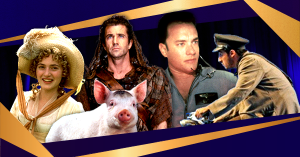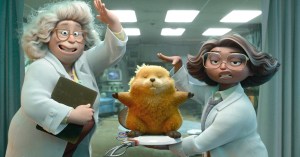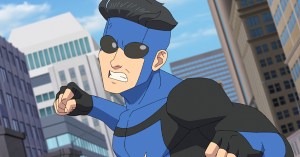Total Recall: David Morse’s Best Movies
We count down the best-reviewed work of the Drive Angry star.
He may not be a household name, but David Morse is one of America’s most recognizable actors, thanks to a 30-year career that has taken him from the stage (including an Obie-winning performance in How I Learned to Drive) to the TV screen (where his résumé includes a six-year run on St. Elsewhere) and more than 40 films. This weekend, Morse will appear as Nicolas Cage’s shotgun-toting buddy in Drive Angry, which naturally got us thinking about the many highlights in one of Hollywood’s preeminent “that guy” filmographies. From supporting roles to starring turns, here’s the best of David Morse!
10. Disturbia
Offering a modern spin on Rear Window, D.J. Caruso’s Disturbia traces the fallout after a high school student with a chip on his shoulder (Shia LaBeouf) attacks one of his teachers, is sentenced to house arrest — and develops a suspicion that his creepy neighbor is secretly a serial killer. More than capable of playing sympathetic characters, but just as comfortable exuding an air of effortless menace, Morse was the perfect guy to play the darkly ambiguous Robert Turner — and Disturbia made for a perfectly entertaining spring thriller according to critics like Ruthe Stein of the San Francisco Chronicle, who wrote, “Caruso, a very visual director, serves up some surprises and scares, and he’s paced his movie briskly. You’re out of this disturbing suburbia before you know it, shaken and even stirred.”
9. The Long Kiss Goodnight
Renny Harlin movies aren’t exactly known for their character development, and 1996’s Shane Black-scripted The Long Kiss Goodnight is no different — in a movie this obsessed with rapid-fire quips, explosions, and piled-up corpses, you root for the good guys and cheer for the disposal of cartoon villains. Case in point: David Morse’s Luke, a.k.a. Daedalus, an arms-dealing heavy who makes things difficult for the amnesiac CIA assassin played by Geena Davis — first he’s nasty, then he’s dead. But if Goodnight isn’t exactly thoughtful, or even particularly memorable, plenty of critics thought it was good, dumb fun — like Michael Dequina of The Movie Report, who asked, “Who can resist the sight of Davis tossing her daughter from a hole in her house into the nearby treehouse or chasing after a car… while ice skating?”
8. The Indian Runner
Sean Penn marked his directorial debut with this 1991 drama, which he was inspired to write by Bruce Springsteen’s “Highway Patrolman.” Like the song — and the album it’s from, 1982’s Nebraska — it tells a tale of hard times and hard choices, strained family obligations and fraternal betrayal, and the seemingly arbitrary way life can erode even the noblest hearts and best intentions. At its center is the conflict between an upstanding deputy sheriff (David Morse) and his ne’er-do-well brother (Viggo Mortensen), recently returned to town to wreak havoc on the lives of his loved ones. It’s familiar stuff, to be sure, and some critics felt Penn’s undisciplined approach prevented The Indian Runner from achieving its full potential — but Roger Ebert was among the majority when he wrote, “It’s impressive, how thoughtfully Penn handles this material. The good brother isn’t a straight arrow, and the bad brother isn’t romanticized as a rebel without a cause, and there are no easy solutions or neat little happy endings for this story. It’s as intractable as life itself.”
7. The Slaughter Rule
Whenever you see David Morse on the screen, you know you’re in good hands, but he’d probably be among the first to admit that a lot of his film roles haven’t given him a chance to display much of his range. It was all the more gratifying, then, to see Morse in The Slaughter Rule, a Sundance-approved drama about a troubled high school football player (Ryan Gosling) whose friendship with a semi-pro coach (Morse) forces both men to deal with suppressed emotions — not to mention the whispers of small-town life. “The film’s powerful meditation on masculinity gets much of its credibility and punch from the two leads,” wrote the AV Club’s Scott Tobias, adding “especially Morse, a reliable character actor who sinks his teeth into a role with heavy physical and psychological demands.”
6. The Crossing Guard
Written and directed by Sean Penn, The Crossing Guard gave Morse one of his meatier film roles: John Booth, a drunk driver who comes home from prison to find that even though he’s done his time, he still has to face the grief-consumed Freddy Gale (Jack Nicholson), whose daughter he killed behind the wheel. Unsurprisingly, Freddy wants to murder John; what lends Crossing unexpected poignancy is the fact that John wants him to. It’s obviously a very dark, sad film, and a number of critics felt that Penn didn’t bring enough sensitivity to the material — but most critics’ thoughts echoed those of Entertainment Weekly’s Owen Gleiberman, who admitted it was a “self-conscious anthem to macho despair” while praising Penn’s handling of the cast: “He coaxes a soul-torn grief out of Nicholson that’s shocking to behold, and Morse, who suggests a burlier version of Jon Voight, has a gentle-giant melancholy that borders on grace.”
5. The Negotiator
The cop thriller The Negotiator is primarily a showcase for the dramatic chops of Samuel L. Jackson and Kevin Spacey, but give director F. Gary Gray credit for refusing to skimp on the supporting cast — he surrounded his leads with talent, including J.T. Walsh, Paul Giamatti, John Spencer, and (of course) David Morse. Starring Jackson as a police negotiator framed for embezzlement, and Spacey as the other negotiator who gets called in when Jackson’s character takes hostages in a desperate bid to clear his name, this wasn’t one of the year’s bigger hits at the box office — but it did impress critics like Ron Wells of Film Threat, who chuckled, “I’m glad Warner Bros. has gone back to making movies instead of theme park rides.”
4. The Green Mile
Like the Stephen King story that inspired it, Frank Darabont’s The Green Mile is a resolutely tender film. It’s underscored with an appropriate level of tension and dread, given its death row setting, not to mention the presence of nefarious characters like the psychotic prison guard Percy Wetmore (Doug Hutchison) — but to a large extent, it’s a story about finding grace where you least expect it, and this is partly exemplified through David Morse’s character, the guard Brutus “Brutal” Howell, whose violent nickname and imposing physical size belie his compassion and intelligence. The Green Mile is pretty big, too, and its 188-minute length scared off a few viewers, but most critics felt it was worth the time — including Joe Baltake of the Sacramento Bee, who wrote, “Superior craft is something we’ve come to expect from modern movies, but not soul. It’s the soul of this movie that’s so heartening.”
3. Mother and Child
Writer-director Rodrigo Garcia Barcha followed his Sixth Sense-ish thriller Passengers with this quiet character study, which traces the impact of adoption through the stories of three women (played by Annette Bening, Naomi Watts, and Kerry Washington) and their families. In a supporting role, Morse joined an ensemble cast that included Jimmy Smits, Amy Brenneman, and Samuel L. Jackson — a tremendously talented group whose subtle work helped critics look past Mother and Child‘s occasionally bumpy script. “The film reminds us that character, not plot, is what binds us to a story,” observed Colin Covert of the Minneapolis Star Tribune. “Cutting between scenes of each in her unique environment, the movie tantalizes us.”
2. 12 Monkeys
Even in a filmography dotted with supporting roles, Morse’s appearance in 12 Monkeys isn’t one of his bigger parts; in fact, ReelViews’ James Berardinelli dismissed it as “hardly worth mentioning.” In terms of sheer screen time, James has a point — but it’s also worth noting that Morse’s character, Dr. Peters, is responsible for setting in motion the events that drive the entire storyline. Either way, 12 Monkeys was director Terry Gilliam’s biggest box office hit — and a critical high point to boot. Janet Maslin of the New York Times, for one, thought it contained some of his best work: “There’s always overripe method to his madness,” observed Maslin, “but in the new 12 Monkeys Mr. Gilliam’s methods are uncommonly wrenching and strong.”
1. The Hurt Locker
The Hurt Locker is essentially Jeremy Renner’s show, but scattered throughout his cinematic coming-out party are brief appearances by a number of familiar faces, including Ralph Fiennes, Guy Pearce, and — as Colonel Reed, a fellow soldier who can’t help but be impressed by Renner’s bravado during a confrontation with an IED-planting sniper — the one and only David Morse. Commercially speaking, Locker suffered roughly the same dismal fate as pretty much every movie about the ongoing war in Iraq, but what it lacked in box office receipts, it made up in acclaim — including six Academy Awards (among them Best Picture and a history-making Best Director for Kathryn Bigelow) and raves from critics like Steven Rea of the Philadelphia Inquirer, who observed, “Like all the best war movies — no matter what war, what era — The Hurt Locker goes to the core of human nature.”
In case you were wondering, here are Morse’s top 10 movies according RT users’ scores:
1. The Green Mile — 93%
2. Dancer in the Dark — 90%
3. The Rock — 85%
4. 12 Monkeys — 84%
5. The Hurt Locker — 83%
6. The Indian Runner — 78%
7. Mother and Child — 77%
8. The Negotiator — 76%
9. Disturbia — 75%
10. Contact — 74%
Take a look through Morse’s complete filmography, as well as the rest of our Total Recall archives. And don’t forget to check out the reviews for Drive Angry.





